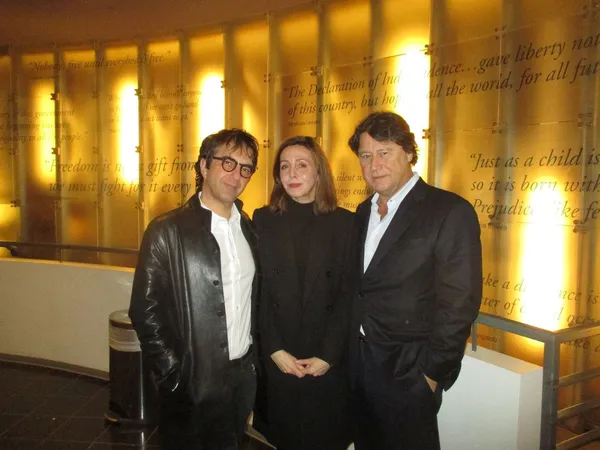 |
| Atom Egoyan and Robert Lantos with Anne-Katrin Titze at the Museum of Tolerance |
Robert Lantos, the producer of Academy Award and Golden Globe nominated films; David Cronenberg's Eastern Promises (Naomi Watts, Viggo Mortensen, Armin Mueller-Stahl); Richard J. Lewis's Barney’s Version (Paul Giamatti, Rosamund Pike); István Szabó's Being Julia (Annette Bening, Jeremy Irons, Michael Gambon) and Sunshine (Ralph Fiennes, Rosemary Harris, Rachel Weisz) joined Atom Egoyan for a post screening conversation on Remember. He is also the executive producer of Atom's double Oscar nominated The Sweet Hereafter (Ian Holm, Sarah Polley). Remember, written by Benjamin August, stars Christopher Plummer and Martin Landau with Bruno Ganz, Heinz Lieven, Dean Norris and Jürgen Prochnow.
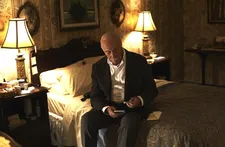 |
| Christopher Plummer as Zev Gutman: "I've worked with Chris on Ararat" |
Wheelchair user Max Rosenbaum (Landau), who has a horrible cough, has prepared a letter for his friend Zev Gutman (Plummer), which is much more than a memory aide, that starts out by informing him about Zev's wife's death. Max has made arrangements to send him on a road trip to find someone they knew in Auschwitz. "Besides me, you are the only person who can still recognise the face of the man who murdered our families," he explains to Zev, clouded by dementia, why he has to bolt from the nursing home to go on a mission.
The man Zev Gutman is looking for goes by the name Rudy Kurlander, which appropriately is pronounced "colander" until we see it written on a package. The man's identity is a sieve. There are four Rudy Kurlanders on Max's checklist, any one of them could be using the pseudonym to hide their SS past as a commander in Auschwitz.
By train, by bus, crossing the border into Canada and back to the US, our guide with fleeting memory stops in places full of American mystique. Boise, Reno, Nevada and Tahoe, names with mid-century patina and poetry, do not exactly match the look of the places Zev is staying at. Hotels look like nursing homes resembling hospitals.
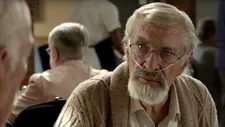 |
| Martin Landau as Max Rosenbaum: "I've worked with Martin Landau almost 30 years ago on an episode of Alfred Hitchcock Presents." |
Four times Zev interacts with children, each one of them extraordinarily kind and polite and interested in the old man who doesn't seem to remember, until he does. Their ever so slight otherworldly quality adds texture and an additional footnote on ravaging time. Guns are another forcefully revealing strand in Remember. Having Alzheimer's and looking confused? Want to buy a gun? No problem - here is your Gluck. The encounters on the road are as precise as they are disturbing.
At the Museum of Tolerance in New York, we began with the cast.
Anne-Katrin Titze: I would like to start with your choice of actors. It seems to me that their past roles inform the film. Christopher Plummer seems to whisper inaudibly throughout "Remember The Sound of Music?" Martin Landau is carrying us through this, in a way, road trip going North by Northwest.
There is Bruno Ganz who is famous for playing Hitler and Germany's most famous angel [in Wim Wenders' Wings Of Desire]. Jürgen Prochnow, the fourth Kurlander is the submarine captain in Das Boot. How much did the past film roles inform your choice?
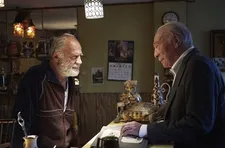 |
| Rudy Kurlander #1 (Bruno Ganz) with Zev |
Atom Egoyan: That's a great question. I think that Christopher Plummer and Martin Landau came immediately to my head. I've worked with both of them before. I've worked with Chris on Ararat and I've worked with Martin Landau almost 30 years ago on an episode of Alfred Hitchcock Presents. It was an incredible experience because he had worked with Hitchcock in North By Northwest.
I was a kid at the time and it was just so thrilling to get these stories what Hitchcock was like on set from Martin who was so generous. He has so many stories. Chris, because I think he is one of the greatest actors in the English speaking language when you put together his work through stage and screen. I see everything he has done on Broadway or in Stratford in Canada.
This is a role with no subtext. Because of his early onset dementia he has no sense of who he is in the present. He is just playing the present for what it is. And Christopher Plummer makes that so vivid and so urgent and yet you understand that he is carrying this extraordinary past which he doesn't seem to be connected to. And of course Martin Landau understands it completely.
Robert Lantos: To add to that - you asked about how it came about this cast - this was not the kind of movie where you audition actors. The casting was all done based on their body of work, on what they had already done. How we knew them, what we knew of them.
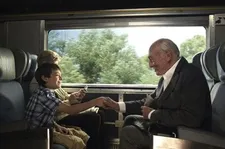 |
| Tyler (Peter DaCunha) with Zev: "They want to give him aid, they want to give him direction." |
AKT: It's a wonderful film about gun control.
RL: That's why we made it!
AE: That's why we made the film!
AKT: "Could you write down for me how I use this gun?" [says the old, confused man when he buys the gun]. The gun scenes are absolutely fantastic. Was this in the script originally?
AE: Yes. I mean, it was Robert's idea to have the cross border scene where he brings the gun to Canada. That wasn't in the script, right? That's something you concocted.
RL: Yeah. The script, you know, went through several incarnations after Atom and I became involved with it. To me, one of the most delicious scenes in this film, from the time that I first read it was when he gets caught, when he sets off the metal detector. He gets caught with a gun and the security guard admires the gun and says "that was like my first gun." To me it spoke volumes about where we're at. You know, we live in Canada, so it's quite different. To me it was one of the reasons to make this film.
AKT: It is also lovely that he puts it in this toiletry bag he is carrying around. The name Kurlander, for a while when they were pronouncing it, I thought of colander, with holes in it. The identity is a sieve.
_225.webp) |
| Zev Gutman: "He is just playing the present for what it is." |
AE: Oh, that is very interesting. That's a very good observation. You've got to ask Ben [August, the screenwriter]. Actually, that wasn't the original name.
RL: We had to change the name a few times because we had to have legal clearance to use a name. We couldn't use the original name in the script because somebody had it. There was no hidden meaning. Thank you for pointing that out to us.
AKT: Well, sometimes coincidences work really well. The children in the film had an otherworldly quality. They were so friendly. If you go outside here, riding the subway, you'd have a hard time finding such friendly children. They also had some dreamlike, fairy-tale quality to them. Can you talk a bit about those helpful children?
AE: The most challenging thing about this film was to create this tone where it was at once natural but there was something slightly heightened about it and almost in his state of mind. So that everyone is helpful to him. It seems that everyone is extending themselves, everyone is reaching out. It seems to be that that's either what he generates because of his persona that he has created for himself or that's the way he sees things as well. I think with the children, starting with the young boy [Tyler] on the train, there is that feeling because he [Zev] seems so helpless, people reach out. They want to give him aid, they want to give him direction.
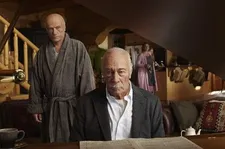 |
| Zev with Rudy Kurlander #4 (Jürgen Prochnow) |
They see that he is lost. Whether or not that is something he just learned how to do - you know, people who are dealing with dementia sometimes learn certain habits of how to behave and they can really embody this because they need to extract that help from other people. With the children, it's not a sentimental view. As you said, it's unworldly. The little girl [Molly] is quite unworldly but it's also unworldly that she is actual reading an assassination order and the first question she says is "So, she is not bringing any candy?" She is not registering. They are not really understanding what they are dealing with.
AKT: The places you chose seem at times really interchangeable. The nursing home looks like the hotel, looks like the hospital. We also as an audience get lost.
AE: Absolutely. That's a great observation because that was something we wanted to do with the production design. There is something anonymous about all these transitional spaces. That contrasts with the places where people are actually living. Obviously where the Neo-Nazi is living.
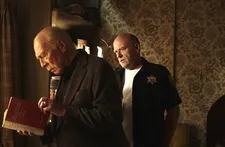 |
| Zev with John Kurlander (Dean Norris) |
There is a strong sense of where the last Kurlander is living but again it's slightly dream-like in this strange kind of gingerbread building, a Bavarian fantasy that this guy gets to live in the middle of nowhere [reminding me of the village in The Dead Man And Being Happy, directed by Javier Rebollo].
Likewise, the neo-Nazis living beside an open pit. And it's still active and we hear the sounds of the explosions. There is something either dream-like or nightmarish but it's punctuated by these nondescript and almost bland transitional spaces.
AKT: Hearing you pronounce the name Kurlander now made me think - wasn't there a film with Sean Connery where he played some mythological Scottish hero? "There can be only one"?
The audience shouts "Outlander," then "Highlander!"
AKT: Highlander! Christopher Plummer has something heroic on his mission. He has some James Bond quality.
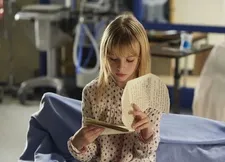 |
| Molly (Sofia Wells): "She is not registering." |
AE: At the end of the day, he is obviously very good at following orders. That's what he does… Christopher Plummer is a puppet ultimately to Landau's plan.
RL: We are at the Simon Wiesenthal Center, so I think it's important to point out that we associated the Martin Landau character with Simon Wiesenthal who stands for bringing the war criminals to justice as opposed to killing them. Justice, I think, is the key word here.
Read what Atom Egoyan had to say about the residual idea of The Sound Of Music, North By Northwest and Slavoj Žižek, meeting Son Of Saul director László Nemes in Sarajevo, Christopher Nolan's Memento and Leviticus.
Remember opens in the US on March 11 and will screen in the CineMasters section of the Glasgow Film Festival.





















